Remote Audio Recording: 10 Must-have Tools for Podcasters
Doing a remote audio recording has been a good transition for podcasters, as staying at home is needed for a prolonged period. However, some find themselves bothered by sudden changes and are looking for a tool that can help them achieve quality content. In terms of traveling, scheduling, and connecting guests remotely, it’s been a necessity up to this day. Thus, this post gathered the 10 best software alongside tips for you to record audio remotely smoothly.
Guide List
Top 10 Platforms for Remote Audio Recordings 5 Useful Tips for Making High-quality Remote Audio Recordings FAQsTop 10 Platforms for Remote Audio Recordings
For those who are more established to in-person setups of doing podcasts, improve your mastery of remote recording with the assistance of the platforms below. Without much to say, here are some of the advised remote audio recorders to use:
1. Alitu
It is an all-in-one remote audio recorder that offers quality sound for your podcast. Alitu utilizes great artificial intelligence so that you can record calls and let it do its magic, such as applying noise reduction, voice leveling, and compression. Right after that, you can edit the audio recording within the program to add intros, outro, effects, etc. You can then publish it to your hosting platform.
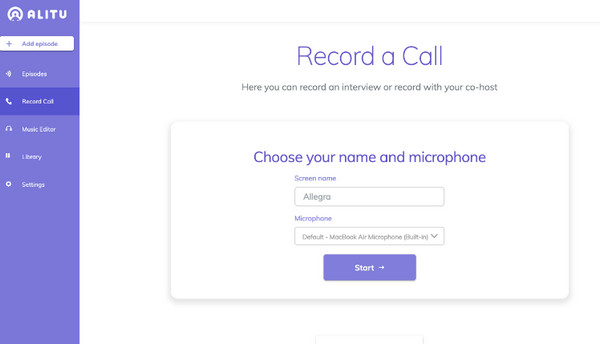
- Pros
- Present a clean and intuitive workspace.
- Support having tutorial services.
- Offer non-paid theme effects and music.
- Cons
- Insufficient editing tools compared to others.
- Can be set up for one input only.
2. Riverside
Riverside is creator-friendly software that can get you confident in doing remote audio recording. Its local recording service enables you to get content up to 4K and 48kHz in the absence of glitches. Aside from that, you can record multiple tracks separately, live streams, and trim audio recordings as easily as ABC. Although it records everything directly to each device, no connection issues can occur.
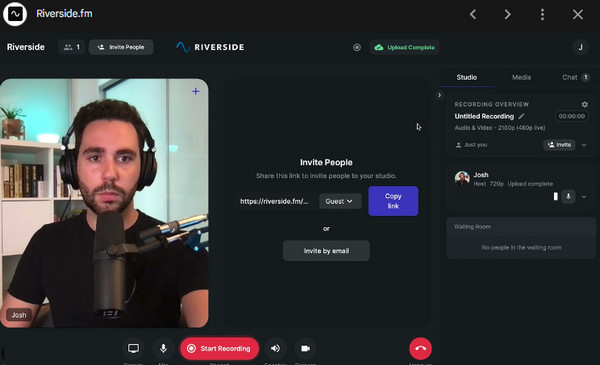
- Pros
- Can record solo or with up to 7 participants.
- All video files are in location automatically.
- Let the producers control the recording without them being recorded.
- Cons
- Once kicked out, you may not recover your recording.
3. Zencastr
Another web-based remote audio recorder, Zencastr, covers recording and downloading quality sound files directly from your browser. Though it offers both free and paid subscriptions, for most podcasters, the free tier satisfies their needs. Also, thanks to the multi-track recording, the quality is ensured regardless of the potential connection issues, as the tool records each side of the conversation individually before syncing them together.
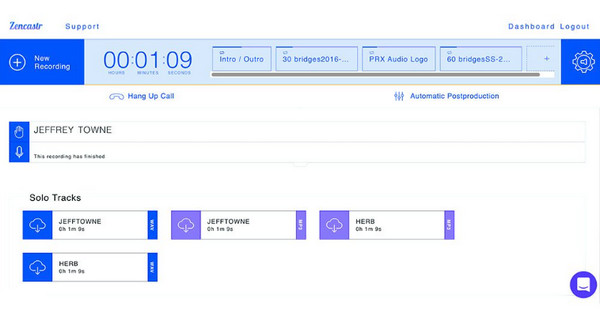
- Pros
- Integrate with cloud services like Google Drive and Dropbox.
- The free version offers almost all the tools needed for your podcast.
- Provide great quality recording in testing.
- Cons
- Paid subscription plans are higher than others.
- Offer no editing and publishing tools.
4. SquadCast
Giving you studio-quality audio recordings, SquadCast is a great platform for remote audio recording. It provides a vast number of features that’ll help podcasters' content to the next level easily, including fast upload, automatic backup, recording locally and in separate tracks, etc. Plus, this remote recording podcast platform has an option where you can record one host and up to three participants in your content.
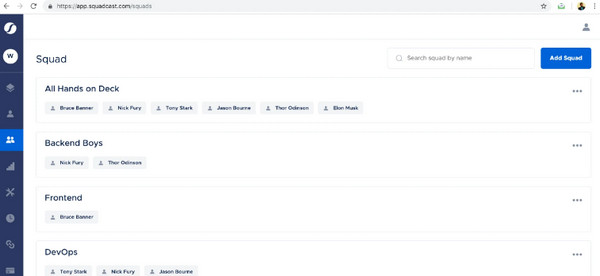
- Pros
- No additional programs to record sessions.
- All audio recordings are backed up to the cloud.
- Provide a quick post-production.
- Cons
- Lack of browsers and device support.
- Offer no screen sharing and a free version.
5. Ringr
As for this remote recording software Ringr, you will be glad with its simplicity yet offering great sound quality. If you want something that can sound like your record in a professional studio, then try Ringr. The good thing is that you can have Ringr on both iOS and Android, aside from being a web-based tool. Also, all their plans offer unlimited calls, a green room, and storage for your remote audio recordings.
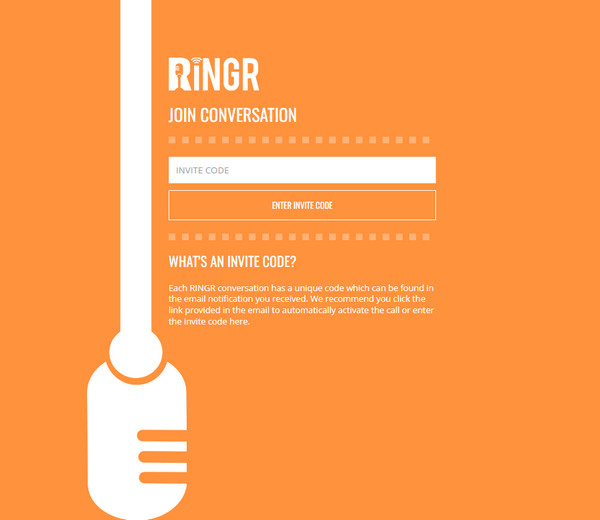
- Pros
- Work with no problem with mobile devices.
- Have a very smooth service.
- Provide a one-month free account trial.
- Cons
- Only 2 participants in a recording.
- Getting audio on different tracks requires payment.
6. Iris
On the other hand, Iris provides a joyful experience in recording with its HD video, separate audio tracks, and a straightforward UI with many features. What’s more, this remote audio recorder is completely web-based, letting any member access their account, all recordings, and schedules from any browser on any device. Moreover, it provides a great support system, such as built-in chat, invite method, and so forth.
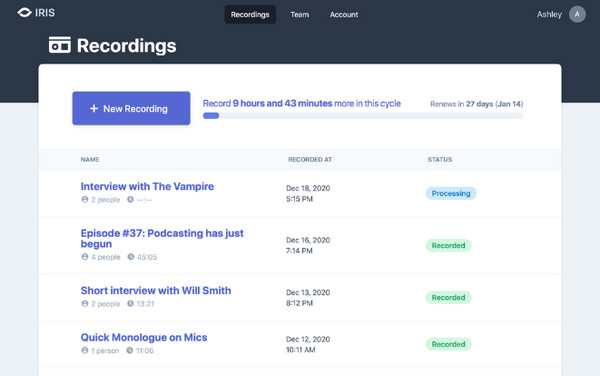
- Pros
- It no doubt has an easy-to-operate UI.
- Offer a dark mode and automated uploads.
- Cons
- Recording mostly gets stuck many times.
- The processing may take hours.
7. Cleanfeed
A different browser-based Cleanfeed for remote audio recording offers lots of valuable features, like volume control, adding multiple devices, audio repair, and so on. It is incredibly flexible wherein you can connect with many guests who can join the session using their laptop, PC, tablet, or mobile phones. A crystal-clear audio and quality service is waiting for you here in Cleanfeed.
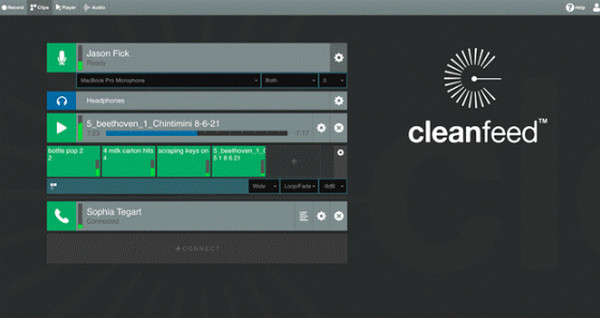
- Pros
- Within minutes, you can start your interview and recording.
- Provide no time limits on recordings.
- Choose how to record sessions, even on individual tracks.
- Cons
- It is problematic with its echo cancellation.
- You may often run into setup complications.
8. Spreaker
Spreaker is another ideal option for those who wish to merge their need for podcasts with a mobile recording app. What’s even better is that you will find its mobile app easy to operate. After all, it’s simply to do remote audio recording with your phone. You can also take advantage of its one-click feature to share your podcast with other main platforms. Overall, Spreaker provides you with high-quality audio even at your home.
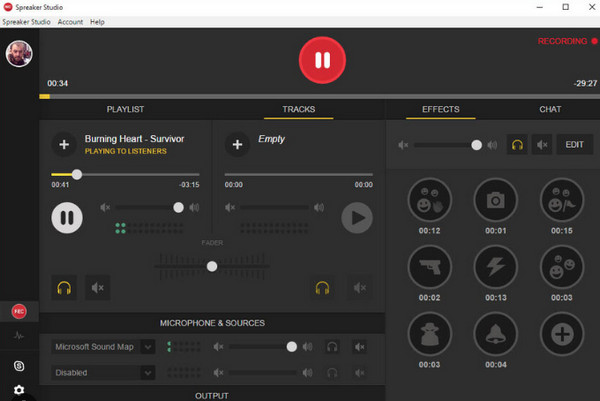
- Pros
- Let you have many podcasts connected with your account.
- Adapts podcasts in different styles.
- Compatible with many lossless files.
- Cons
- It won’t fulfill your needs in video podcasting.
- Its livestream functionality is limited.
9. Zoom
The popular Zoom app is among the programs that have been most used for over a year and a half. It’s not just capable of doing virtual meetings, but it also has options to record and host podcasts. Furthermore, the variety of options for remote audio recording lets you record separate audio tracks. Even if it’s not primarily used for podcasting, Zoom is ideal for beginners as it works for more purposes.
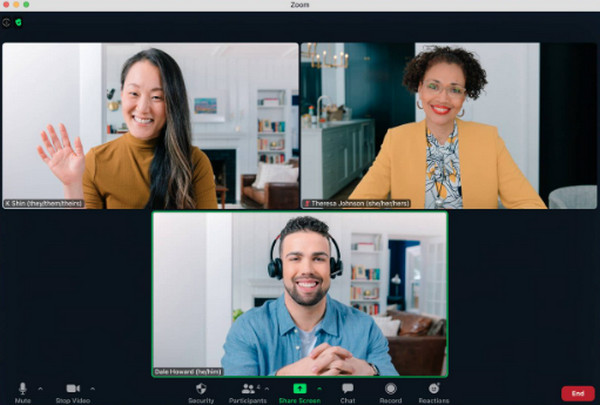
- Pros
- Have support for a wide number of participants.
- Can stream meetings or webinars on social media.
- Track daily activities with Google Calendar.
- Cons
- The HD quality isn’t standard.
- Lack comment controls.
10. Cast
After Zoom, Cast is an award-winning podcasting service that lets aspiring podcasters record, edit, and share episodes. It’s a great choice for starters, as you will be introduced to its all-in-one solutions in recording quality audio and making use of its built-in editor, all within the program. It's worth the time to try an excellent remote audio recorder like Cast without requiring extra software.
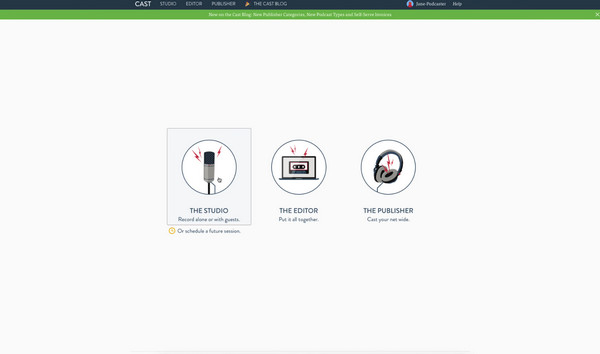
- Pros
- Excellent for both beginners and professionals.
- Offer powerful presets like compression.
- Have live texts and shows notes in real-time.
- Cons
- No free version is available.
That’s all for the remote audio recorders that everyone will be enjoyed to use. While all of them can provide what you need for doing your podcasts, when doing real-time talking and recording at the same time, lagging and an unsmooth recording aren’t avoidable, particularly when one of you is playing background music. What will you do in this situation, then? To answer this concern, see the bonus tip waiting for you.
Bonus Tips: Record Remote Audio Without Any Lag or Sync Problem
Without much explanation, you’ll need a program like AnyRec Screen Recorder to avoid such delay problems in recording audio remotely. With it, you can record your audio separately and combine them right after. This free lightweight recording software offers you a solution for recording audio using the Audio Recorder built, both internet and external audio simultaneously, without sacrificing the quality nor lag problem. Also, you will have many options for exporting your recorded audio, including MP3, AAC, M4A, and other popular formats. Whether you record your own audiobooks, calls, gameplay, or lectures, this tool will slay your overall demands.
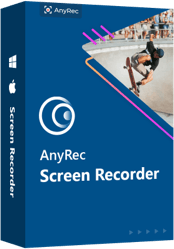
Able to record the audio from the system and microphone with no lag.
Trim useless parts in the preview before exporting your recorded audio.
No time recording limit; you can do remote audio recording for long time.
Noise cancellation and audio enhancement to make high-quality recordings.
Secure Download
Secure Download
5 Useful Tips for Making High-quality Remote Audio Recordings
It’s now much easier to do a remote audio recording using the above software, fulfilling your podcast needs. But before doing that, some things must be kept in mind to provide your viewers or listeners with a quality podcast.
1. Prepare your recording studio. Before getting started, ensure you’re at the best and quietest place possible. Your recording will be of high quality if you capture great vocals without noises, echoes, or other distractions in your environment.
2. Send out the recording setup to your guest. Actually, this one is optional, as when it comes to recording, your guest's audio needs to be as good as yours. So, if somehow your guest cannot afford the equipment, you can consider providing them with a remote recording device such as a microphone, stand, and pop filter.
3. Host one or two people at once. It’s true that you can record multiple speakers at the same time, but something might be a mess if you deal with many connections. Therefore, make it easy for everyone by not involving many people in a remote recording session.
4. Have the perfect remote recording platform. Pick a tool primarily made for remote recording. You can go back and take a peek at the discussed remote recording software, which provides tons of features, allowing you to have a great recording experience.
5. Use a video for your podcast. Although you’re not planning to do a video podcast and just simply a remote audio recording, you can use some video feed where you guys see others while recording. Seeing each other's reactions will build a comfortable conversation.
FAQs
-
What is a remote audio recording?
It is simply the act of recording audio on location or not in a recording studio; it makes use of multitrack capturing techniques outside of a studio, for instance, a live concert or a solo podcast.
-
Is Zoom effective for recording podcasts?
Even though it can help you record podcasts and offers a free solution for remote interviews, it may not satisfy you in terms of overall quality. In this case, use a tool that is specifically for recording podcasts.
-
What things should I prepare before recording audio remotely for a podcast?
Make sure both you and your guest have workable and quality equipment, such as a microphone, and means that can help eliminate noises, a quiet recording area, and a stable connection.
-
Can I use Audacity for remote audio recording?
No. You cannot do remote recording with Audacity, though you can record audio, but if you want to include participants, you’ll have to use different software.
-
Is it possible to do a remote audio recording on my phone?
Yes. With some dedicated platforms that can be used on either desktop, online, or mobile, you can record audio remotely; one of the tools to use is Riverside.
Conclusion
There you have it! You see a powerful remote audio recording software that offers many benefits to you yet has some drawbacks that can be improved. Hopefully, one of them got your attention so that you could start your remote audio recording project. If you still don’t have one in mind, the AnyRec Screen Recorder – the powerful audio recording software is suggested. Do voiceovers, trim, and merge them within the program like a pro later. Make sure to check it out so you won’t miss its exciting feature ahead.
Secure Download
Secure Download
